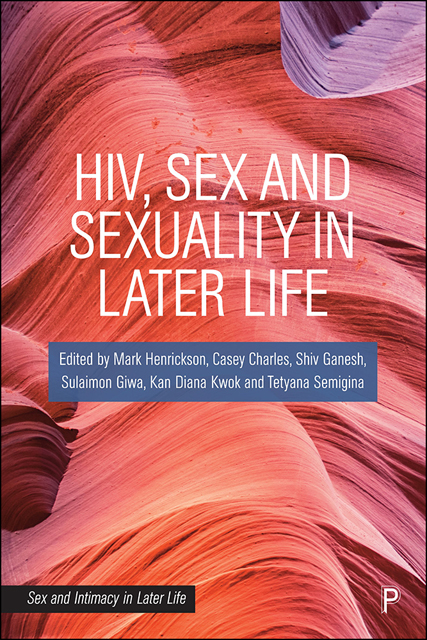Introduction
Published online by Cambridge University Press: 16 June 2023
Summary
This book would have been unimaginable 35 years ago.
And yet, here we are. That, perhaps, is the central, unifying theme to this volume: all kinds of people living with HIV are alive, growing older and seeking to live all of their lives, including their sexual selves.
The world has been distracted by a different pandemic over the last few years, and certainly the readily transmissible COVID-19 has presented a major threat to the world and the global health infrastructure. But COVID-19 is far more promiscuous than HIV/AIDS about people it infects, which means stigma against people living with the coronavirus has been very limited, and protests have been more against government regulation and interventions than people with the coronavirus. The global health community, while arguably not in a timely enough way, moved with remarkable speed for such bureaucratic organisations. With a few notable exceptions, government responses to COVID-19 have been unprecedentedly rapid and robust. These responses have been far different from government responses to AIDS in the earliest days, when AIDS was called ‘GRID’ (1982, Gay-Related Immune Deficiency) in the United States, and from the refusal for years of some governments to acknowledge HIV in their countries (Boone and Batsell, 2001; Chigwedere et al, 2008; King, 2021). UNAIDS (2021) estimates that nearly 38 million people were living with HIV in 2020; since the start of the epidemic in the late 1970s, 79.3 million have been infected with HIV and 36.3 million have died from AIDS-related illnesses. Most of those infected and affected by HIV were in already-stigmatised communities: people in poor countries, poor people in wealthy countries, people of colour, men who have sex with men, injection drug users and combinations of all of these. The intersecting diseases of virus, stigma, fear, racism and discrimination greatly impeded the development of care for people living with HIV. It is notable that, because of the tremendous research foundation laid in the search for HIV treatments and vaccines, vaccines for COVID-19 were produced with unprecedented speed (Zuckerman and McKay, 2020).
The editors and contributors to this book have decades of experience of living with HIV or working with people living with HIV.
- Type
- Chapter
- Information
- HIV, Sex and Sexuality in Later Life , pp. 1 - 8Publisher: Bristol University PressPrint publication year: 2022

